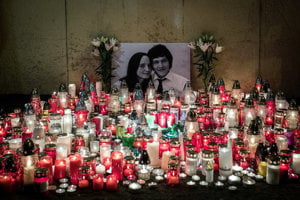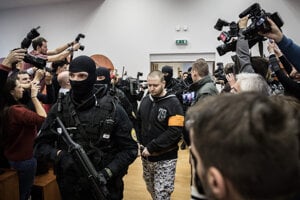An historic court trial has wrapped and awaits a verdict on September 3.
 How the Kuciak case changed Slovakia (overview) Read more
How the Kuciak case changed Slovakia (overview) Read more The proceedings in the case of the murder of investigative reporter Ján Kuciak and his fiancée Martina Kušnírová ended after 22 days, with final closing speeches. The Specialised Criminal Court was expected to issue the verdict on August 5, but later postponed it to September 3, with senate chair Ružena Sabová explaining that the senate needs to continue discussing the verdict.
The Denník N meanwhile reported it is not clear whether the verdict will be announced on September 3 due to the extensive evidence proposed by the prosecutor’s office.
Kuciak and Kušnírová were killed in their house in Veľká Mača on February 21, 2018. Shortly after their dead bodies were discovered on February 26, 2018, the police said that the murder was most likely linked to Kuciak’s journalistic work.
Unlike most cases of murdered journalists in the world, the police detained and charged not just the persons whom they believe to have fired the shots, but also those who ordered the murder.
The trial with Marián Kočner, Alena Zsuzsová, Tomáš Szabó and Miroslav Marček started on January 13, 2020. The initial sessions saw unprecedented interest among both Slovak and international media. The process thus took place in a special room at the Justice Academy in Pezinok.
Marček pleaded guilty and has since been sentenced to 23 years in prison.
The prosecutor proposes a 25-year prison sentence for the remaining three defendants: Kočner, who is said to have ordered Kuciak’s murder during which Kušnírová was also killed; Zsuzsová, who mediated the murder; and Szabó, who is charged with committing the murder.
Key testimonies
During the very first trial session on January 13, Miroslav Marček pleaded guilty. He admitted to committing both the murder of Kuciak and Kušnírová, and the unrelated murder of Kolárovo businessman Peter Molnár. He also described how they prepared and executed the murder, while his cousin Szabó offered an alternative explanation.
The court subsequently ruled to deal with him in a separate trial and sentenced him to 23 years in prison. The verdict is not valid yet.
During the second court session held on January 14, the court heard Zoltán Andruskó, a middleman in the Kuciak murder case who was collaborating with the police and sentenced to 15 years in prison already in December 2019. He linked Zsuzsová and Kočner to the murder.
 Kuciak murder investigation: A timeline Read more
Kuciak murder investigation: A timeline Read more Another important witness came to the stand on January 15. Former journalist-turned-spy and one-time friend of Kočner, Peter Tóth, came forward as a witness in the case on October 5, 2018, two days after Zsuzsová was detained and charged with ordering the murder.
“I haven’t the slightest doubt that these two people plotted and prepared the murder of Ján Kuciak,” Tóth told the court about Kočner and Zsuzsová.
He also claimed that Norbert Bödör, the son of the Bonul security service company's founder Miroslav Bödör, contributed to the surveillance of journalists financially and through his contacts.
Andruskó pointed to Bödör’s involvement in his July 21 testimony.
In the closing speeches, the defendants and their lawyers tried to cast doubt on the trustworthiness of these three witnesses.
Threema and GPS data as evidence
An important piece of evidence in the case is the communication encrypted via the Threema app, which was found in Kočner’s mobile phones. Despite several attempts to prevent reading from it, the court accepted it as proof, and it was read aloud by the prosecutor on May 19.
 Martina Kušnírová: Who was she? Read more
Martina Kušnírová: Who was she? Read more According to the prosecutor, the messages were to prove the involvement of Kočner and Zsuzsová in the murder. They both have refuted the claim, and said the texts had been taken out of context and that some texts were missing.
A significant role in the case was also played by the Europol and Interpol staff that testified in court on February 6. One Europol forensic investigator extracted data from 12 devices, among them the phones and SIM cards of Zsuzsová and Kočner. The other one extracted data from other devices the police seized during house searches, such as hard drives and computers. Media were not allowed to remain in the courtroom when hearing the Europol specialists. Despite objections to the Slovak investigators cooperating with Europol, the court confirmed that it considered the cooperation legal and proper.
The pictures from the surveillance of journalists, including the photos capturing Kuciak, found on the USB flash disk in Kočner’s possession, are considered important evidence.
Other notable moments
The court invited several people who commented either about Threema or the surveillance of journalists.
Norbert Bödör, who testified on January 20, denied all the allegations Tóth has voiced against him in his testimony, including his participation in the surveillance of journalists. His testimony is not in line with Kočner’s leaked Threema messages.
Another witness, Penta financial group partner Jaroslav Haščák, admitted on the same day that Kočner and Bödör belonged among his wider circle of acquaintances. He insisted in front of the court that he was now 100 percent sure the vulgar message, which suggested Kočner was working on eliminating an unnamed man, had nothing to do with Kuciak.
 Kuciak did not even have a computer as a child and he grew up to be an analyst Read more
Kuciak did not even have a computer as a child and he grew up to be an analyst Read more The January 22 session presented the testimonies of Miroslav Kriak, one of the persons who conducted the illegal surveillance of journalists for Tóth, and Štefan Mlynarčík, the man recruited to help Kriak with the job. They both claimed that they believed they were working for the state and that their assignment was linked with revealing drug-related crimes.
Defendants refute guilt
The closing speeches were delivered over two days: July 23 and July 31.
Prosecutor Vladimír Turan summed up the evidence, mentioning in particular the messages that Kočner and Zsuzsová exchanged in the coded app Threema, sometimes using their own coded language. He then proposed a sentence of 25 years in prison for all the defendants.
Lawyer for the Kuciak family Daniel Lipšic, in his closing speech stressed the motive for the murder, summing up the evidence and testimonies. Roman Kvasnica, the lawyer of Zlatica Kušnírová, the mother of murdered Martina, said he was certain that the real culprits are facing the court.
Speaking on July 31, the defendants and their lawyers made their final statements to the court.
The lawyer representing Marian Kočner, Marek Para, started his speech by pointing to the leaks and the media coverage of the trial. A criticism of the media coverage has been mentioned by other defence lawyers as well.
Kočner insisted that he had no motive to have Kuciak murdered, and also compared himself to Milada Horáková, a victim of Communist-era fabricated proceedings.
“For two years the media have made me the murderer because nobody in the world is a better fit for than me. I am not a person without flaws, nobody is,” Kočner said, and later added “I am not a saint, but neither am I a murderer.”
 Murder of journalist: How did Ján and Martina die? Read more
Murder of journalist: How did Ján and Martina die? Read more Zsuzsová and Szabó also insisted on their innocence in their closing speeches.
“The evidence collected during a preparatory proceeding clearly and without any doubt indicate that it was Marian Kočner who had a motive to order the murder; he also had funds and opportunities,” said Juraj Novocký, one of the two prosecutors who supervised the investigation of the murders, in a recent interview with the Denník N daily. Novocky has recently been chosen to serve at the European Public Prosecutor's Office.
If the evidence, even the indirect pieces, are put together, they create an integrated whole, he continued.
Police officer Peter Juhás, who led the Kuciak investigation team, is convinced that Kočner is the person behind the murder.
“No evidence indicates that someone else ordered the murder," he told the Aktuality.sk website.
This article was first published on August 4, 2020.
Read more about the Kuciak case
>>> Who was Ján Kuciak and how did he become a journalist?
>>> Slovakia: Timeline of events during the first year after the murder
>>> Who are the people charged in the murder case?
>>> How the trial went in its initial days (overview)
>>> Read more about how the Kuciak case changed Slovakia












